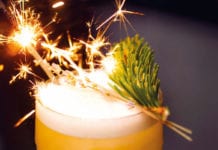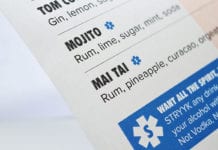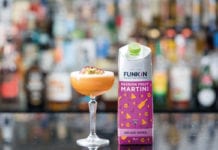The provenance of products can impact on an outlet’s sales, say firms
The provenance of bottled water is becoming increasingly important to consumers and operators must reflect this in their drinks range, say drinks firms.
Water is seen by many people as a healthy alternative and producers are keen to emphasise the origins and source of their products.

“Provenance and product benefits are becoming increasingly important to consumers, particularly in relation to water,” said Alan Hay, on-trade controller at AG Barr, the firm behind Strathmore.
“People are not only looking for water brands they know and trust, they are also increasingly conscious about the source of the water which reinforces the provenance message.”
Hay said operators should cater
for those seeking a premium brand when they go out to a bar or restaurant.
“When consumers visit licensed outlets for a drink or to dine, they are looking for something beyond what they have at home, no matter what type of establishment they are visiting,” he said.
“This also applies to bottled water – and a premium, trusted brand served from a glass bottle will always have great appeal.”
Bottled water is also proving popular as a healthy alternative, said Amy Ledger, of drinks supplier CWF.
This, she said, had prompted a rise in the popularity of premium Italian bottled water.
“We have seen a growth in our sales of water over the past couple of years,” said Ledger.
“A refreshing alternative to some
of the lacklustre soft and carbonated drinks that are available, water is
fast becoming the tipple of choice across a broad range of the social spectrum.
“Whether the consumer’s preference is for a non-alcoholic drink because they are driving or looking for something healthy and nutritious, the range of soft drinks available can be very uninspiring, often just a poor selection of sickly sweet soft or carbonated drinks.”
Ledger said the firm anticipated a continued rise in mineral water sales across the trade this year.
She said the popularity of ‘dry’ bars in other parts of the UK showed an appetite for water and no-alcohol options.
“We expect more to follow as people catch onto the new zeitgeist that fun does not always have to include alcohol and soft drinks aren’t boring,” said Ledger.
Jo Jacobius, director of trade organisation British Bottled Water Producers, acknowledged that price can be an issue when choosing which brands to stock.
But she said it is important to ensure outlets stock high quality products.
“There is often a lack of choice in the on-trade but where this is the case people often choose on the basis of taste, depending on whether the water is to be drunk alone or as an accompaniment to wines or other drinks,” she said.
High quality water is said to be particularly important at outlets serving food, according to Bob Woolf, managing director of Halewood International-owned water brand Willow Water.
He said: “There is an increasing demand from chefs at premium hotels and restaurants for premium water to match the food that they are serving their clientele.
“Consumers are taking note of the source of their water and regional water is becoming increasingly popular among restaurant-goers and with heads of households.”
Bottled water brands aren’t the only options open to operators who want to provide customers with high quality water.
Stephen Charles, managing director at water filtration system Vivreau, said: “A decent water offering is surprisingly simple to achieve, and can be done in-house instead of outsourcing bottled water.”























